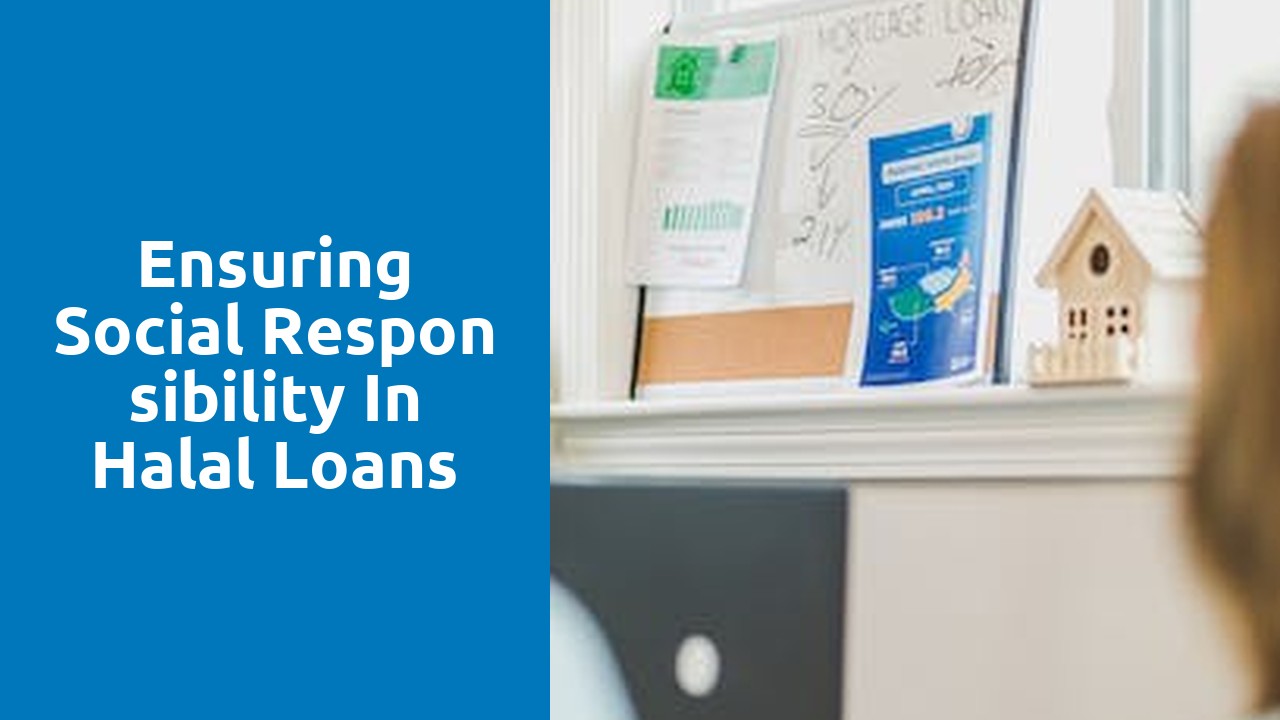Ensuring Social Responsibility in Halal Loans

Table Of Contents
Ethical Practices in Islamic Financing: A Closer Look
Ethical practices form the foundation of Islamic financing, shaping its core principles and values. A closer examination reveals the emphasis placed on transparency, fairness, and social responsibility in the Islamic banking system. Islamic financing, based on Shariah principles, aims to promote economic growth and development while adhering to ethical guidelines that ensure the well-being of society as a whole.
Transparency is a key aspect of ethical practices in Islamic financing. It ensures that all parties involved in a financial transaction have access to complete and accurate information, promoting trust and accountability. Islamic banks and financial institutions are required to disclose their operational and financial details, allowing customers and stakeholders to make informed decisions. This transparent approach not only strengthens the integrity of the system but also fosters confidence in Islamic financing as a reliable and ethical alternative to conventional banking.
Promoting Transparency in Halal Loans
Promoting transparency is a key aspect of ensuring ethical practices in halal loans. Transparency is essential to establish trust and confidence among borrowers and investors. When it comes to Islamic financing, transparency involves providing complete and accurate information about the loan terms, fees, and any potential risks involved. By promoting transparency, financial institutions can demonstrate their commitment to ethical practices and build strong relationships with their clients.
One way to promote transparency in halal loans is through detailed disclosure of the loan agreements. This includes clearly stating the terms and conditions of the loan, such as the repayment schedule, the applicable profit rates, and any penalties for late payments. Additionally, it is important to provide a breakdown of the fees and charges associated with the loan. By providing borrowers with this information upfront, financial institutions can ensure that borrowers are well-informed about their financial obligations and can make informed decisions. Ultimately, promoting transparency in halal loans not only enhances the credibility of financial institutions but also fosters a healthy and ethical environment for Islamic banking.
Empowering Communities through Socially Responsible Financing
Empowering communities through socially responsible financing is a core objective of Islamic banking and finance. This approach goes beyond the mere provision of financial services to individuals and businesses. It aims to generate positive social impacts and contribute to the overall development of communities. By focusing on the needs of the people and prioritizing the betterment of society, Islamic financing can truly become a catalyst for empowerment.
One way in which socially responsible financing empowers communities is through the promotion of entrepreneurship. Islamic banks and financial institutions provide funding and support to budding entrepreneurs, particularly those in underprivileged areas. This enables individuals to create their own businesses, generate income, and improve their overall economic status. By emphasizing entrepreneurship, Islamic financing not only empowers individuals but also contributes to job creation, economic growth, and poverty reduction at the community level.
Putting People before Profit: The Role of Social Responsibility in Halal Loans
Halal loans, like any other form of financing, have the potential to prioritize profit-making over the welfare of individuals and communities. However, a notable aspect of halal loans is their emphasis on social responsibility and putting people before profit. This ethical framework is deeply rooted in Islamic principles, which emphasize fairness, justice, and compassion towards fellow human beings.
One of the key roles of social responsibility in halal loans is the promotion of financial inclusion. Unlike traditional banking systems, Islamic finance aims to provide equal opportunities for all individuals, regardless of their socio-economic background. This means that halal loans are not solely focused on profit, but also on empowering marginalized communities and ensuring their access to financial services. By prioritizing social responsibility, halal loans can help bridge the gap between the haves and the have-nots, promoting a more inclusive and equitable society.
Navigating the Intersection of Ethics and Finance in Islamic Banking
Islamic banking operates at the intersection of ethics and finance, requiring practitioners to navigate the delicate balance between profitability and adherence to ethical principles. Unlike conventional banking, which often prioritizes maximizing profits, Islamic finance seeks to foster social justice and economic stability while operating within the framework of Shariah law. This unique approach challenges financial institutions to align their business practices with the values and principles of Islam.
At the heart of Islamic banking lies the prohibition of interest, or riba, which is considered exploitative and unfair. Instead, Islamic financial institutions employ a range of alternative financial instruments rooted in profit and risk sharing, such as profit-sharing agreements (Mudarabah), joint ventures (Musharakah), and leasing arrangements (Ijarah). By embracing these principles, Islamic banking promotes equity, fairness, and social responsibility. However, this intersection of ethics and finance also presents a complex landscape where banks must find innovative solutions to ensure both profitability and compliance with Islamic principles.
Building Trust in Halal Financing: The Importance of Social Responsibility
Building trust in halal financing is paramount in Islamic banking, as it directly relates to the ethical practices and social responsibility upheld by financial institutions offering halal loans. Trust is the foundation that establishes a strong relationship between the customers and the banks, ensuring transparency, fairness, and accountability in the financial transactions. By embodying social responsibility, banks can demonstrate their commitment to the values and principles of Islamic finance, thereby gaining the trust of the Muslim community.
Furthermore, social responsibility in halal financing goes beyond meeting the basic ethical standards; it also involves empowering communities and making a positive impact on society. Islamic banks have the opportunity to use their resources and influence to support charitable causes, promote economic development, and provide financial assistance to those in need. Through socially responsible financing, banks can contribute to the well-being and progress of society, enriching lives and strengthening the trust placed in them by the Muslim community.
Related Links
Principles of Transparency and Disclosure in Halal LoansRespecting Ethical Standards in Halal Loans